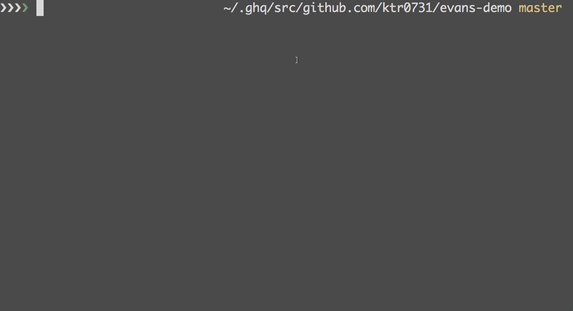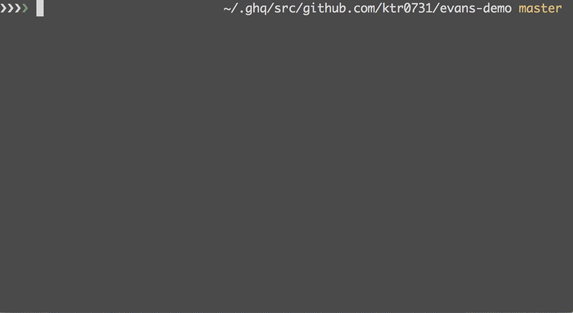Evans has been created to use easier than other existing gRPC clients.
If you want to keep your product quality, you must use CI with gRPC testing, should not do use manually testing.
Evans will complete your other use cases just like:
- Manually gRPC API inspection
- To automate some tasks by scripting
Above use cases is corresponding to Evans's two modes, REPL mode, and CLI mode.

REPL mode is the solution for first use case.
You can use it without thinking like package name, service name, RPC name, command usage, and so on because REPL mode has powerful completion!
CLI mode is stateless mode just like grpc-ecosystem/polyglot.
It sends one request per one command as its name suggests.
So it is based on UNIX philosophy.
For example, read inputs from stdin, the command will be a filter command.
On the other hand, the command result will be outputted to stdout by JSON formatted.
So, you can format it by any commands like jq. Also, if you want to use the same command (e.g. use same JSON inputs), you can use --file (-f) option.
- Installation
- Usage (REPL)
- Usage (CLI)
- Other features
- Supported IDL (interface definition language)
- See Also
Highly recommended methods are GitHub Releases or Homebrew because these can be software update automatically by the built-in feature in Evans.
Please see GitHub Releases.
Available binaries are:
- macOS
- Linux
- Windows
$ brew tap ktr0731/evans
$ brew install evansGo v1.11.5 (with mod-aware mode) or later required.
go get installation is not supported officially.
$ go get github.com/ktr0731/evansEvans consists of some commands in REPL mode.
The proto file which read in the demonstration and its implementation are available at ktr0731/grpc-test.
grpc-test's details can see grpc-test --help.
Enter to REPL.
$ cd grpc-test
$ evans api/api.protoIf your server is enabling gRPC reflection, you can launch Evans with only -r (--reflection) option.
$ evans -rAlso if the server requires secure TLS connections, you can launch Evans with the -t (--tls) option.
$ evans --tls --host example.com -rTo show package names of proto files REPL read:
> show package
+---------+
| PACKAGE |
+---------+
| api |
+---------+
To show the summary of services or messages:
> package api
> show service
+---------+----------------------+-----------------------------+----------------+
| SERVICE | RPC | REQUESTTYPE | RESPONSETYPE |
+---------+----------------------+-----------------------------+----------------+
| Example | Unary | SimpleRequest | SimpleResponse |
| | UnaryMessage | UnaryMessageRequest | SimpleResponse |
| | UnaryRepeated | UnaryRepeatedRequest | SimpleResponse |
| | UnaryRepeatedMessage | UnaryRepeatedMessageRequest | SimpleResponse |
| | UnaryRepeatedEnum | UnaryRepeatedEnumRequest | SimpleResponse |
| | UnarySelf | UnarySelfRequest | SimpleResponse |
| | UnaryMap | UnaryMapRequest | SimpleResponse |
| | UnaryMapMessage | UnaryMapMessageRequest | SimpleResponse |
| | UnaryOneof | UnaryOneofRequest | SimpleResponse |
| | UnaryEnum | UnaryEnumRequest | SimpleResponse |
| | UnaryBytes | UnaryBytesRequest | SimpleResponse |
| | ClientStreaming | SimpleRequest | SimpleResponse |
| | ServerStreaming | SimpleRequest | SimpleResponse |
| | BidiStreaming | SimpleRequest | SimpleResponse |
+---------+----------------------+-----------------------------+----------------+
> show message
+-----------------------------+
| MESSAGE |
+-----------------------------+
| SimpleRequest |
| SimpleResponse |
| Name |
| UnaryMessageRequest |
| UnaryRepeatedRequest |
| UnaryRepeatedMessageRequest |
| UnaryRepeatedEnumRequest |
| UnarySelfRequest |
| Person |
| UnaryMapRequest |
| UnaryMapMessageRequest |
| UnaryOneofRequest |
| UnaryEnumRequest |
| UnaryBytesRequest |
+-----------------------------+
To show more description of a message:
> desc SimpleRequest
+-------+-------------+
| FIELD | TYPE |
+-------+-------------+
| name | TYPE_STRING |
+-------+-------------+
Set headers for each request:
> header -h
usage: header <key>=<value>[, <key>=<value>...]
> header foo=bar
To show headers:
> show header
+-------------+-------+
| KEY | VAL |
+-------------+-------+
| foo | bar |
| grpc-client | evans |
+-------------+-------+
To remove the added header:
> header foo
> show header
+-------------+-------+
| KEY | VAL |
+-------------+-------+
| grpc-client | evans |
+-------------+-------+
Call a RPC:
> service Example
> call Unary
name (TYPE_STRING) => ktr
{
"message": "hello, ktr"
}
Evans constructs a gRPC request interactively and sends the request to a gRPC server.
Finally, Evans prints the JSON formatted result.
repeated is an array-like data structure.
You can input some values and finish with CTRL-D
> call UnaryRepeated
<repeated> name (TYPE_STRING) => foo
<repeated> name (TYPE_STRING) => bar
<repeated> name (TYPE_STRING) => baz
<repeated> name (TYPE_STRING) =>
{
"message": "hello, foo, bar, baz"
}
You can select one from the proposed selections.
To abort it, input CTRL-C.
> call UnaryEnum
? UnaryEnumRequest [Use arrows to move, type to filter]
> Male
Female
{
"message": "M"
}
You can use byte literal and Unicode literal.
> call UnaryBytes
data (TYPE_BYTES) => \x46\x6f\x6f
{
"message": "received: (bytes) 46 6f 6f, (string) Foo"
}
> call UnaryBytes
data (TYPE_BYTES) => \u65e5\u672c\u8a9e
{
"message": "received: (bytes) e6 97 a5 e6 9c ac e8 aa 9e, (string) 日本語"
}
Client streaming RPC accepts some requests and then returns only one response.
Finish request inputting with CTRL-D
> call ClientStreaming
name (TYPE_STRING) => ktr
name (TYPE_STRING) => ktr
name (TYPE_STRING) => ktr
name (TYPE_STRING) =>
{
"message": "ktr, you greet 3 times."
}
Server streaming RPC accepts only one request and then returns some responses. Each response is represented as another JSON formatted output.
name (TYPE_STRING) => ktr
{
"message": "hello ktr, I greet 0 times."
}
{
"message": "hello ktr, I greet 1 times."
}
Bidirectional streaming RPC accepts some requests and returns some responses corresponding to each request. Finish request inputting with CTRL-D
> call BidiStreaming
name (TYPE_STRING) => foo
{
"message": "hello foo, I greet 0 times."
}
{
"message": "hello foo, I greet 1 times."
}
{
"message": "hello foo, I greet 2 times."
}
name (TYPE_STRING) => bar
{
"message": "hello bar, I greet 0 times."
}
name (TYPE_STRING) =>
You can input requests from stdin or files.
Unlike REPL mode, you need to specify --package, --service and --call options.
If gRPC server enables gRPC reflection, --package is unnecessary. (instead, -r requires)
Use --file (-f) to specify a file.
$ cat request.json
{
"name": "ktr"
}
$ evans --service Example --call Unary --file request.json
{
"message": "hello, ktr"
}Use stdin.
$ echo '{ "name": "ktr" }' | evans --service Example --call Unary
{
"message": "hello, ktr"
}If .evans.toml is exist in Git project root, you can denote default values.
[default]
protoFile = ["api/api.proto"]
package = "api"
service = "Example"Then, the command will be more clear.
$ echo '{ "name": ["foo", "bar"] }' | evans -r --service Example --call UnaryRepeated
{
"message": "hello, foo, bar"
}$ echo '{ "gender": 0 }' | evans -r --service Example --call UnaryEnum
{
"message": "M"
}You need to encode bytes by Base64.
This constraint is come from Go's standard package encoding/json
$ echo 'Foo' | base64
Rm9vCg==
$ echo '{"data": "Rm9vCg=="}' | evans -r --service Example --call UnaryBytes$ echo '{ "name": "ktr" } { "name": "ktr" }' | evans -r --service Example --call ClientStreaming
{
"message": "ktr, you greet 2 times."
}$ echo '{ "name": "ktr" }' | evans -r --service Example --call ServerStreaming
{
"message": "hello ktr, I greet 0 times."
}
{
"message": "hello ktr, I greet 1 times."
}
{
"message": "hello ktr, I greet 2 times."
}$ echo '{ "name": "foo" } { "name": "bar" }' | evans -r --service Example --call BidiStreaming
{
"message": "hello foo, I greet 0 times."
}
{
"message": "hello foo, I greet 1 times."
}
{
"message": "hello foo, I greet 2 times."
}
{
"message": "hello foo, I greet 3 times."
}
{
"message": "hello bar, I greet 0 times."
}Evans also support gRPC Web protocol.
Tested gRPC Web implementations are:
At the moment TLS is not supported for gRPC Web.


